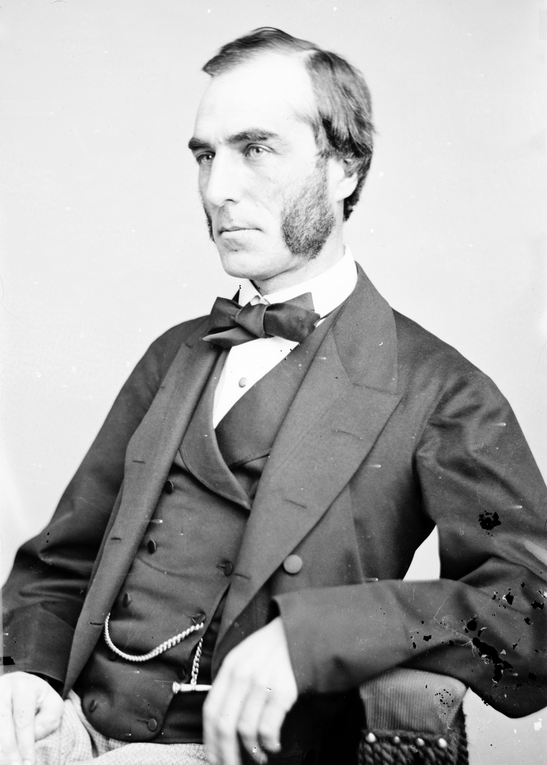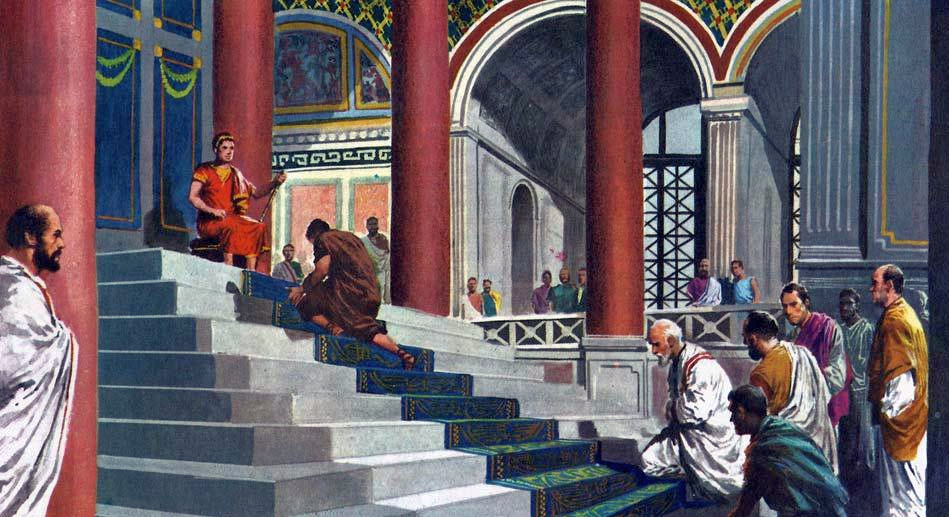Editor’s note: The following article by Prof. Goldwin Smith — a response to Richard Congreve’s four-lecture series, “The Roman Empire of the West” — is extracted from Oxford Essays (published 1856).
Neither can the Empire be said in any way to have renounced the spirit of conquest, though there was not much left to conquer, and the power of conquering gradually failed, through the decline of patriotism and valour, and the fatal influence which the cold shadow of Despotism exercised on military as on all other talent. Its diplomacy was just as unscrupulous, and proceeded in just the same way, by breeding up pretenders and fomenting intestine quarrels in foreign countries, as that of the senate in its worst days.
That the Roman emperors were in one sense popular is true. Like even Louis Quatorze, they feared the mob of the capital, and bribed the cobblers with bread and shows while they bathed in the blood of the Lamiæ. But the people, if they were gorged with the slaughter of provincial gladiators, and fed with food torn from the mouths of the provincials, can scarcely have been elevated either in a moral or industrial point of view above their condition in the days of the Republic. And if they were degraded, it would be making too much of the blood of an aristocrat to suppose that it could mitigate their degradation. The great evils of society, so far from being removed, were aggravated. Luxury advanced to a pitch of grossness which left far behind the luxury of Lucullus. The gulf between the rich and the poor grew wider, and nowhere is the misery and degradation of poverty painted more feelingly than in Juvenal. The concentration of property in a few hands, instead of diminishing, increased, so that at last six proprietors owned the whole province of Africa. The old aristocracy was exterminated, and with it the old aristocratic code of morals; but a new aristocracy arose, as a new aristocracy will rise round any court — the aristocracy not of the Scipios and the Æmilii, but of Sejanus, Pallas, and Tigellinus. We need scarcely speak of the morals which are painted by Tacitus, Suetonius, and Juvenal. A new moral principle, such as the world had never seen, did indeed appear under the Empire, and commence the regeneration of society, the purification of the human soul, and the reconciliation of poor and rich, the freeman and the slave. This principle appeared, and the Empire recognised the affinity of a kindred power by immolating Christianity to its own diabolical pride.
It is singular, considering that consensus which positive science has shown to exist between all the functions of humanity, that while the state of the political faculties under the Empire was so high, the state of all the other faculties should have been so low. Mr. Congreve dispenses himself from considering the history of literature under the Empire, and we cannot but think that he exercises a wise discretion in doing so. Literature there was; but in almost every department it was a wretched decrepitude of the literature of the Republic, and ranks as low as possible among the works of human mind. One great historian and one great satirist the Empire produced; but both were inspired by enmity to those beneficent institutions which, as the first intellects of their time, they ought especially to have appreciated and admired. If there was a danger of such occurrences under a popular monarchy, it would be requisite to suppress literature, and be content with political science.
Mr. Congreve dwells, not without reason, on the merits of the imperial law. We confess we should feel a certain moral incongruity of a disagreeable kind if this great benefit to modern society had really emanated from the Roman tyrants. But the work of liberalising the Roman law and adapting it to the needs of humanity was performed entirely by the Stoic sect, the enemies and martyrs of the Empire. To that sect all the great jurists of Rome belonged. We may therefore see in the civil law a monument, not of licentious and despotic force, but of philosophical intellect and public virtue, excluded by baser powers from the government of the world, but still devoting themselves to the service of humanity, and rearing a monument which has long survived the tyranny under which they groaned, and which to them might seem eternal. The first legal mitigation of the lot of the slave is supposed by some to have taken place about the time when, Nero having not yet broken out upon the world, the government was in the hands of Seneca and Burrhus; and it seems to have been confirmed by Hadrian, who was much under the influence of the Stoics.
Mr. Congreve applauds the religious unity of the Empire, and seems inclined even to think that the worship of the emperors was not altogether irrational or injurious. The religious unity of the Empire was simply a unity of irreligion; and when a real religion appeared, the Empire persecuted it. Gibbon forgot that to the politicians of the Empire one religion did not seem ‘equally’ useful with the rest. It was that religion which preached not only the purest morality, but the highest civil duty and the truest loyalty, and which sought to obliterate the social distinctions and antipathies of the world without disturbing its peace, by teaching that in God all are free, and bidding the master kneel down at the Eucharist beside the slave. Let it not be forgotten that it was to the image of Cæsar — to the deified embodiment of the type of all good government, that the Christian was required to burn incense or die. Mr. Congreve has suggested that the supposed offence of the Christians was mutiny. But what sort of police for a paternal government must that have been which mistook St. Paul for a mutineer? We remain of opinion that when Christianity came into contact with sensualist Despotism, a power of good came into contact with a very great and very magnificent power of evil , and that the power of evil was led by its own nature to attempt to exterminate the power of good. The Empire having first attempted to destroy Christianity, ultimately corrupted it by imparting to it its own tyrannical unity, and teaching the Church to persecute heretics in turn. Mr. Congreve seems to think that the persecution of the Arians was a service done to Christianity, as maintaining the unity of the Church, and fitting her to cope more vigorously with her antagonists. But he regards the whole matter as a question of organization. And this is the radical fallacy of the imperialist system. The imperialists forget that you must not only have organization, but life; that free thought is essential to moral and intellectual life; and that all varieties of despotism, down to the very latest improvement, have been essentially hostile to freedom of thought.
Mr. Congreve justly feels it necessary, in recommending as a model for the governments of the world the system of imperial Rome, to deal with the question of the succession. He need entertain no doubts that the succession to the Roman Empire was practically hereditary, though the hereditary principle was modified by domestic intrigue, by domestic assassination, and by the childlessness which so often resulted from Roman morals, and which could not be reckoned on as opening a way for adoptive merit to the throne in the case of any modern empire. Cæsar was prevented by Roman prejudices from bequeathing his power to the son of Cleopatra, though there is some evidence to show that he intended, even in the face of these prejudices, to legitimize Cæsarion, and make him his heir. Octavius had the discretion to put Cæsarion out of the way, that there might not be too many Cæsars. Cæsarion being out of the question, the Empire passed in the same family down to Nero. The line of the Cæsars was then lost in an abyss of civil war. Hereditary succession re-appeared again with the Flavian line. After Domitian came a series of emperors without heirs, who adopted successors of more or less merit, the series ending with Marcus Aurelius. Marcus Aurelius was a man, if there ever was one, who might have been expected to sacrifice the interests of his family to those of the human race. Yet even Marcus Aurelius saw the rising vices of Commodus, and bequeathed to him the dominion of the world. If the principle of hereditary succession was not openly avowed, but veiled under the name of bequest, in deference to the lingering pride of the nation, that only strengthens the case against those who may be disposed to quote the Roman empire as a proof of the practicability of a despotism not hereditary, but devisable, and which should be devised to merit. When you have once made a man absolute, you cannot place him under conditions; and no sovereign who is not under conditions can be expected so far to disregard personal affection and family influences as to leave the crown out of his own family; nor would the heir acquiesce in the deprivation. Those who mean to risk the fortunes of humanity on any such arrangement must have the discretion to revolutionize human nature before they revolutionize the governments of the world.
It is vain to speak of the Roman Empire, or of anything analogous to it, as a provisional autocracy rescuing the nation from faction, and tending to fit it ultimately for self-government. Inconvenient and disagreeable as it may be, it is only in the water that people can learn to swim. We see from the correspondence of Pliny with Trajan what was the civilization of the Roman world under one of the best of emperors. It is the civilization of a sheepfold. The commonest local improvement cannot be undertaken without a reference to the central government at Rome. One may be quite sure that such subjects would have been scared at the idea of self-government, had it ever been presented to them by the angry gods. Such is the inevitable tendency of an arbitrary government. A good despot feels responsible for everything; a bad despot will have everything subject to his licentious will, — religion, education, everything will be drawn into the vortex; and, as a necessary consequence, all self-reliance and all power of self-government will dwindle, not increase, day by day. Everything will be centred in and held together by one man, who may be a tiger or a madman. The idea of a provisional despotism as a means of training a nation for self-government, whether as existing in the past or as possible in the future, seems the wildest of all chimeras. It seems like a proposal to strengthen a man’s limbs and faculties by making him walk on crutches and forbidding him to exercise his mind.
Before we conclude, we cannot help attempting to rescue Marcus Aurelius from the hands of those who would use him as a model of despotism, and a grand instance in favour of absolute power. His name may well excite the imaginations of all who are inclined to a revival of the Roman Empire; though we must remember that even his reign was disturbed by a rebellion, and that even he persecuted, or allowed his police to persecute, the Christians. But the fact is, that though it was impossible at that day to restore liberty to those who had long been unaccustomed to political action, and who had so long been dead to patriotism and public virtue, no man ever was less in favour of despotism than Marcus Aurelius. He was far too good, to say nothing of his wisdom, to desire absolute power over his fellows. His reign, and that of his predecessor, were, in fact, a protest against the government of force . The emperor, in these reigns, was, as far as he could be, the chief of a constitutional state, and the minister of the laws. The great stoic emphatically expressed his conviction that the will of the one ought not to prevail over the reason of many. He was a man who knew the value of moral freedom, and desired to leave men free, — who knew his own nature, and desired to be under law. He is simply calumniated and degraded when he is quoted in favour of despotism, whether ordinary or demagogic.
Let us admit, however, that the Roman Empire, if it was very far from being the enlightened, humanizing, tolerant, popular, and progressive institution which it appears to Mr. Congreve to have been, had its justification. That justification lay in the misgovernment of the provinces during the later days of the senatorial régime, and the difficulty, almost amounting to an impossibility, of any effectual reform. The system of representation, even if it had occurred to any politician of that age, was out of the question, inasmuch as no Roman citizen would have consented to delegate his vote; and the bestowal of the franchise on the Italians had only made matters worse for the provinces by filling the assembly which elected to the offices of government with a venal mob, brought up from the country by political adventurers, and dead alike to national honour and the responsibilities of empire. Under such circumstances, resort might naturally be had to monarchy as the one hope of impartial rule. That hope was frustrated, as we believe, through the fearful effects of despotism on the brain of tyrants who found themselves absolute masters of the world, and absolutely free to gratify their passions without the slightest restraint either from the fear of man or God. But the situation was one for which no analogy can be found in the political circumstances of European nations at the present day. It is preposterous to compare the various classes in a nation to the various nations in the Roman Empire. The suggestion only shows the unhappy tendency to treat government as an eternal war of classes, and politics as a religion of hate. The only thing in the Roman Empire analogous to the dangers and evils of modern society, was the war between the different classes of society in Rome itself. And we see how the Empire dealt with this. It destroyed all the better part of the upper classes, and substituted for them a new upper class of imperial freedmen and sycophants far more luxurious and more oppressive than the old. As to the slave class, it gave them occasional openings as informers against their masters, and raised individuals thereby to the height of infamy, but never attempted to raise the whole body to the level of justice. Under a humane emperor, the lot of the luxurious nobles — with their immense villas, their armies of slaves, and the whole world open to their luxury — was such as a Gibbon might regard with envy. Moral and intellectual degradation apart, they probably passed very happy lives; as happy lives, perhaps, as the French nobility passed at Versailles while the people were eating grass. But they were vile in the midst of their luxury, and further removed from sympathy with the people than the old nobles who had expounded the law to their clients, and sought the great offices of state at the hands of the people.
We must further observe in regard to any attempted comparison between the Roman Empire and the demagogic despotism proposed for society at the present day, that the Roman Empire stood alone in the world. Whatever democratic or tribunitive spirit it might have in it at the commencement, would not be corrupted by evil communications with hereditary despotisms of an ordinary kind. There were no kings to form alliances with, no Popes to be crowned by, no Austrian archduchesses to marry. However omnipotent, the Roman tyrant was alone and without support. His power over the minds of that race of sycophants and slaves was immense, as the reigns of terror which followed Augustus showed; but when that power was exhausted, there were no Austrians in reserve. In the present day, if a democratic despotism were erected, it would very soon be converted into a more familiar object by the sympathy and attentions of neighbouring potentates, not scrupulous about the legitimacy of any ruler who has succeeded in placing his will above the evil principle of law, nor anxious to inquire whether the reverse of the coin bears ‘Republic’ when the obverse bears ‘Emperor.’ And when the limits of submission were reached (and we presume that even Mr. Congreve places some limits to submission) the mutual insurance of despotisms would come in to support the principle of order threatened in the sacred person of a Nero.
Finally, the position of the Roman emperors was partly justified as that of commanders-in-chief of the armies of the civilized world, constantly threatened by the pressure of barbarism on its frontiers. They carried on war, not with more vigour or perseverance than the senate, but, perhaps, with more unity; and though great generals like Germanicus and Agricola were not unfrequently sacrificed to their jealousy, they were sometimes great generals themselves. Their action, as military protectors, was their chief claim to the loyalty of the nations under their sway. A single nation, in spite of what Mr. Congreve says, carries on war much more vigorously as a republic than as a despotism, for the obvious reason that a republic will never enter into a war in which the hearts of the people are not engaged; and Mr. Congreve, who wrote at the beginning of the present war, may now, at its close, see the difference between the perseverance of an autocrat and that of a senate. But a vast group of nations like that which formed the Roman Empire could scarcely use its military power with effect, except under a single chief. We have no such consideration operating in the case of modern civilization, and we must, therefore, not include it among the motives for concentrating power in the hand of a single man. Moreover, constant military employment was furnished for the Roman armies, and they were kept, for the most part, on the frontiers, not in the heart of the empire. This, with the surviving discipline and the surviving military honour of the Republic, enabled the government long to hold at bay the dangers of prætorian domination. A modern empire must have its armies idle and in the heart of the country, with the feeling of their political power constantly present to their minds, and in case of a failure of the imperial line, they must rule the succession. All rational men are ready to have imperialism, like any other theory of political improvement, freely discussed. We are already familiar with it in the Leviathan of Hobbes. We are not discussing it now; we have merely been speaking of Mr. Congreve’s view of the Roman Empire as a great demagogic institution. That Empire remains, in our eyes, what it was before, — a tyranny which perhaps Rome had deserved, and which may or may not have been worse for the world than the tyranny of the senate and people. It was the natural offspring and scourge of a society without morality and without a God. We trust that humanity will never see its like again.










